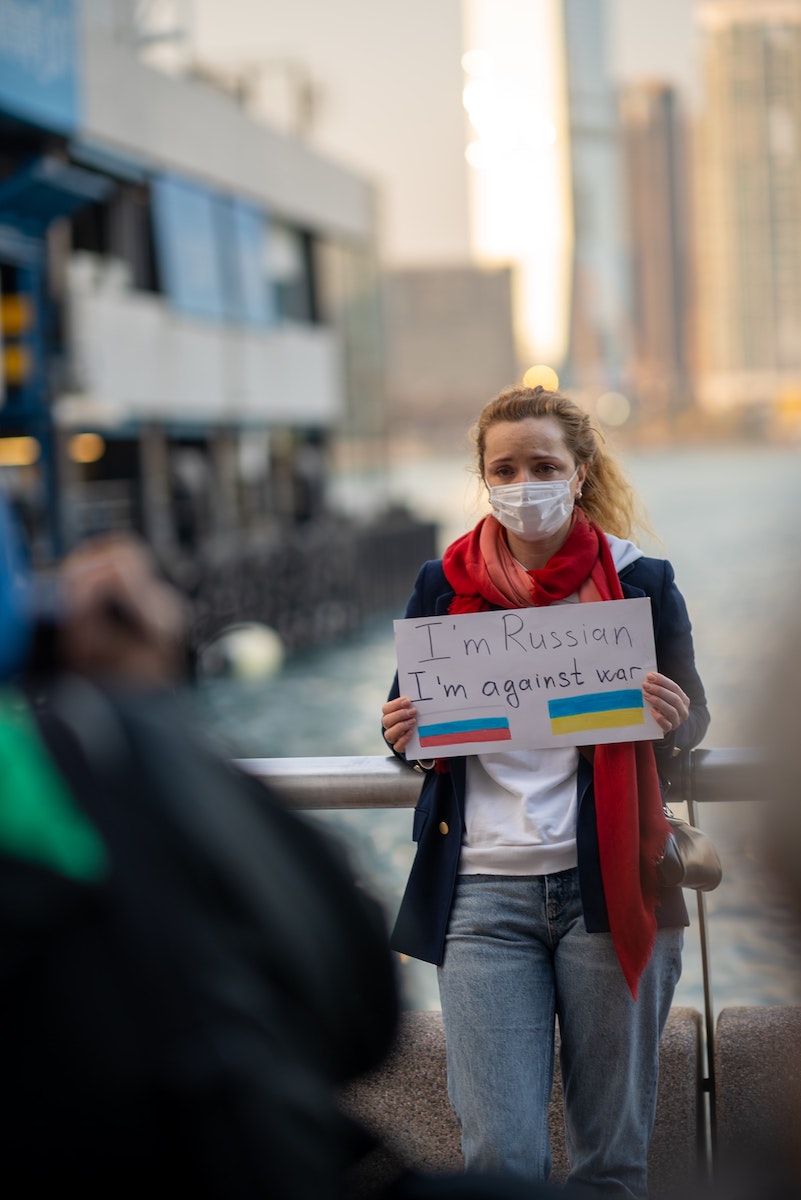In its floundering information war against the West and its own citizenry, the Kremlin has turned to a rhetorical tactic that it has used frequently to demonize domestic and international critics. It has labeled them as “hooligans.” As defined in Russian criminal law, hooliganism is “a flagrant violation of public order that expresses clear disrespect for society.”
Recently, Kremlin spokesman Dmitry Peskov used this term to rebuke Marina Ovsyannikova, the Russian TV producer whose live protest on Russian television has gone viral around the world. When asked about Ovsyannikova’s disruption of a television news program during which she decried the lies on Russian mass media and shouted anti-war slogans, Peskov dismissed it with the curt statement: “This is hooliganism.”
Some may discount such remarks as political theater and immature name calling. To do so, however, is to overlook the rich history of hooliganism in Russian society, culture and criminal justice.
It also ignores the way Putin’s propagandists weaponize words. The Kremlin’s spinmeisters are using the symbolically potent label of hooliganism—like their tendentious use of the explosive term “Nazi”—in an orchestrated campaign to vilify their opponents. The phrase is meant to manipulate public opinion, strengthen social control, and de-legitimize the concerns, anxieties, and outrage of those opposed to Putin’s war in Ukraine.
The Kremlin’s appropriation of hooliganism is more than just an exercise in Orwellian doublespeak. The use of deviant labels to intimidate, silence and incriminate has a deep history in the former Soviet space. In America or Europe, the word functions as an archaic admonishment or is associated with violent forms of soccer fandom. By contrast, hooliganism in Russia is a crime—and has been so for more than a century.
Crying ‘Hooliganism’: An Instrument of Criminalization
During the Soviet period, hooliganism was one of the most common crimes and millions of Soviet citizens were arrested and incarcerated for offenses under this criminal category. Hooliganism was an expansive, conveniently ambiguous, and flexible instrument for criminalizing a wide range of undesirable activity from street brawling and cursing to public drunkenness and domestic violence. For these reasons, hooliganism was an essential tool that the Soviet state used to discipline its population and build ideologically conformist subjects.
By highlighting the outrageous antics of so-called hooligans, the Soviet Union’s state-controlled mass media used deviance to demonstrate to the public the boundaries of acceptable conduct and warn against the consequences of breaching them. This was particularly useful during periods of uncertainty, social stress, and transition when the Kremlin employed campaigns against hooliganism to signal to the Soviet population and show them how they should and should not behave.

As Putin’s Russia abandons the democratic dreams of the 1990s and transitions into an increasingly repressive dictatorship, the post-Communist Kremlin is again using the language of deviance and the laws against hooliganism to stigmatize its opponents, punish its critics, and proclaim its new behavioral redlines to Russian society. Over the last decade, hooliganism has been levied against a broad range of targets from those protesting electoral fraud to Greenpeace activists advocating against plans to drill for Artic oil.
Most famously, members of the performance art group Pussy Riot were convicted of hooliganism for staging an anti-Putin protest in Moscow’s monumental Cathedral of Christ the Savior and spent several years in penal colonies for this demonstration. As such examples make clear, Putin’s Kremlin continues to use the crime of hooliganism to advertise the limits of acceptable public discourse and to punish those—such as Ovsyannikova—who violate them.
Putin’s Historic Playbook
This is not the first time that Putin’s officials have used the language of hooliganism in their campaign to keep Ukraine within Russia’s sphere of influence. During the 2014 Revolution of Dignity that ousted Russia’s last puppet ruler in Ukraine, Russian Foreign Minister Sergei Lavrov—the same functionary who oversaw the run-up to the invasion of Ukraine and recently denied that Russia had attacked its neighbor—denounced the Ukrainian protesters on Kyiv’s Maidan Square as “rampaging hooligans.”
Although Russian aggression against Ukraine may have changed between 2014 and 2022 in its scale and brutality, the language the Kremlin employed to defame and discredit Ukrainians fighting for autonomy from Moscow remains the same.
If Putin’s government is to deal with its domestic and international discontents constructively, it must also stop demonizing them as uncivilized hooligans whose demands should be disregarded as abnormal and illegitimate. The acts of Ovsyannikova and other brave Russian protesters are not a form of criminal deviance. They are the product of a deep unease in Russian society over Putin’s war of aggression and territorial aggrandizement in Ukraine. They are also a reminder that the Kremlin has failed to prepare its people for a war that many Russians—especially in the younger generation—see as immoral, unwarranted and fratricidal.
As ordinary Russians strain under the onerous economic, informational and reputational consequences of Putin’s military adventurism, the Kremlin would be ill-advised to dismiss their legitimate demands and concerns as nothing more than just another form of hooliganism.
This piece was published first by The University of Southern Mississippi.
This MFP Voices essay does not necessarily represent the views of the Mississippi Free Press, its staff or board members. To submit an essay for the MFP Voices section, send up to 1,200 words and factcheck information to azia@mississippifreepress.org. We welcome a wide variety of viewpoints.






